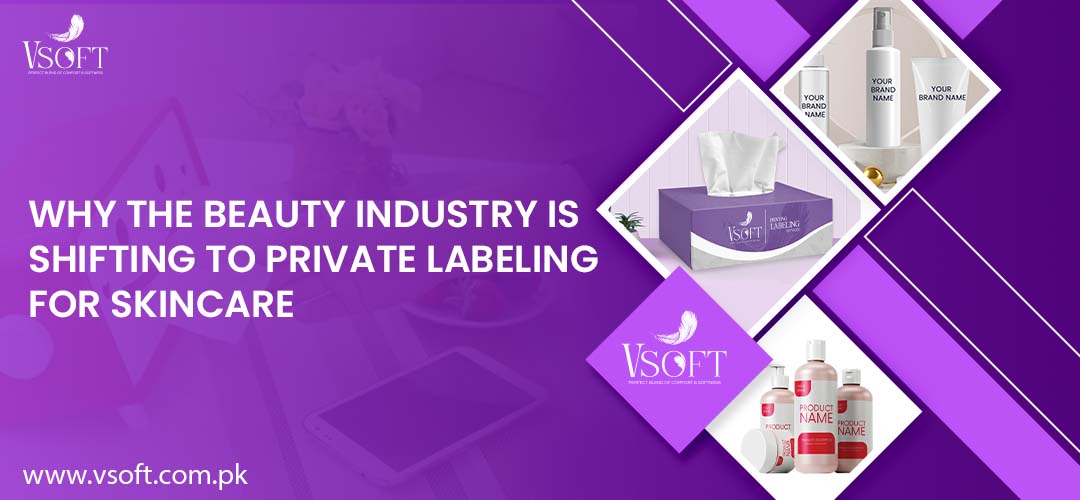Brands in the beauty market are always looking for new methods to satisfy customer wants, therefore this field is always changing. The growing popularity of private label skincare products is one of the most notable trends of the past few years. Skincare companies are accepting private labeling as a strategic approach to respond to clients’ growing concerns about ingredients, sustainability, and personalization.
This blog looks into the reasons for the growing popularity of private-label skincare and the benefits that it gives companies looking to enter into or grow within this sector.
Private Labeling in Skincare
In the skincare industry, private labeling refers to the practice of having a third party manufacturer and retailer sell items under a certain brand name. With private label skincare, companies have to pick from pre-existing formulations and personalize the packaging, branding, and marketing rather than making their own formulae and production procedures as is the case with standard brand manufacturing.
Private labeling allows many companies to skip the difficulties of R&D while still releasing high-quality skincare products. But there are also deceptions out there, like the idea that private label skincare isn’t very original or creative. Actually, private-label manufacturers frequently offer a lot of opportunity for personalization, which helps companies make unique items that appeal to their customers.
Why Beauty Brands Are Going for Private Label Skincare
Customization & Brand Ownership
A major feature of private-label skincare is the freedom to design exclusive products that represent the values of a company. A company’s vision can be reflected in the ingredients, scents, textures, and packaging choices. Companies can reach certain demographics with this level of personalization, whether it’s those looking for vegan skincare, anti-aging remedies, or organic cosmetics.
Cost-Effectiveness & Faster Market Entry
Starting from scratch with a skincare line demands an important financial commitment in R&D, testing, and manufacturing. By providing ready-made formulas, private labeling reduces these expenses and speeds up the market entry process for businesses. With this method, companies can cut down on product development time from years to months, resulting in faster product launches and more profits.
Quality & Compliance Benefits
The safety, effectiveness, and conformity of their private label skincare products are provided by their conformity to high industry standards. Brands can provide high-quality skincare without subjecting their products to strict testing because of the abundance of cruelty-free, hypoallergenic, and dermatologist-tested options available under private label. If you’re a startup trying to establish your reputation fast, this is a must-have.
Private Label vs. Traditional Skincare Manufacturing
When compared to the production of well-known brands, private label skincare is very different in many respects:
Product Development
Custom research & development is an investment for traditional skincare companies, helping them to create unique formulations from the ground up. On the other hand, private label companies might avoid spending a lot on research and development by choosing from pre-existing formulations, which speeds up product creation.
Time to Market
Because private label skincare products use tried-and-true formulations, there are fewer research and compliance challenges, allowing for faster product launches. Nevertheless, conventional brands go through more extensive testing and regulatory procedures to guarantee that their individual formulations are up to standard before being released to the market.
Investment & Risk
The production, testing, and marketing of traditional skincare products demands some initial expenditure. However, private label skincare lowers financial risks by doing away with manufacturing expenditures, allowing startups to enter the market with less cash and fewer complications.
Brand Control
The formulations of traditional brands’ products are completely under their control, meaning that each one has its own special blend of ingredients. While private-label skincare allows for branding, packaging, and minor formulation modifications to differentiate, it limits component modifications and enables customization choices within pre-formulated bases.
Challenges & Considerations
Brand Differentiation in the Market
Strong branding, engaging storytelling, and successful marketing are essential for standing out in a crowded private label skincare industry. Unique component mixes, creative formulations, and visually appealing packaging are three ways that marketers can set their products apart from the competition.
Quality Control & Ingredient Transparency
Transparency in skincare products is a must-have for modern consumers. It is the responsibility of the brands to verify that the private label manufacturer they work with follows the strict quality standards and offers relevant certifications, such those for organic, cruelty-free, and dermatologically tested products.
Scalability & Supply Chain Reliability
Brands need to manage their inventories well and keep supply chain issues to a minimum as demand increases. You must have backup sources or flexible production techniques to grow as necessary because depending on only one manufacturer can be risky.
How VSoft Supports Brands with Private Label Tissue Products
Premium Quality & Customization
Customized solutions adapted to businesses’ needs are offered by VSoft, a specialist in high-quality private label tissue products. When it comes to paper napkins, facial tissues, and other eco-friendly solutions, VSoft provides the best in softness, durability, and compliance with industry standards.
Sustainable Production
Sustainable, biodegradable, and naturally obtained tissue solutions are offered by VSoft in response to the growing need for recyclable products. Brands may collaborate with ecological efforts and yet receive top-tier tissue goods because of their dedication to ethical manufacturing.
Complete Private Labeling Services
The private label process is made easier with VSoft, which handles product development, branding, and packaging. Their simplified production processes and customizable order numbers make it easy for enterprises to introduce and expand their tissue product lines.
Conclusion
The beauty industry’s move toward private label skincare products shows how customer tastes and the market are changing. Brands that don’t have to deal with the difficulties of standard manufacturing can benefit from cost savings, faster product launches, and high-quality formulations.
If you’re ready to start your own skincare company, consider VSoft’s tissue private labeling for skin care. Contact us today to learn how VSoft can help bring your vision to life!


